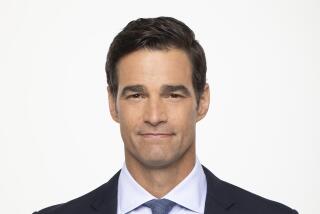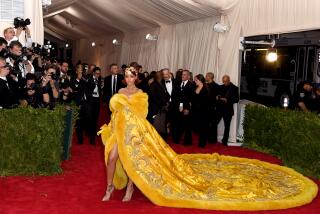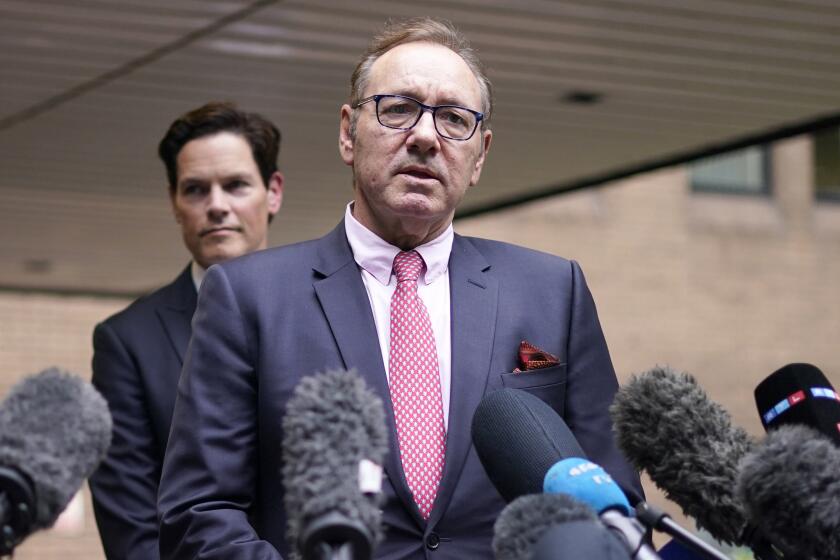Music Firms See Games as Sound Marketing Tools
Forget the MTV Music Awards.
The latest sign a band has arrived on the music scene is when its song blares while two video game characters pummel each other.
For years, record companies considered licensing their music to video games as a meager but steady source of cash. Game developers had tiny budgets compared with movie studios, so games often ended up with obscure songs.
But as sales of video games rival Hollywood box office receipts, the music industry is taking notice. Labels now view games--with a dedicated fan base of young, affluent players--as launching pads for up-and-coming artists.
Game companies, in turn, are trying to capitalize on their newfound popularity, becoming more choosy about which songs they take, asking labels to help promote the games and even popping the artists into the games.
This week, for instance, software firm Electronic Arts Inc. is announcing a deal with Island Def Jam Music Group to jointly produce a series of wrestling games featuring the record label’s top hip-hop artists, including Method Man, DMX, Ludicrous and Noreaga.
The deal, hatched by Def Jam President Kevin Liles and EA Chief Executive Larry Probst, is unusual in that it doesn’t involve licensing songs, the typical route for getting music into games. Instead, Def Jam artists will get royalties on game sales.
“Traditionally, what happens is that a preexisting piece of music is licensed into a game,” said Jeff Kempler, head of business and legal affairs at Island Def Jam, a division of Universal Music Group. “With this, we felt we could together create an integrated entertainment experience with music built into the game from the ground up, as opposed to music added at the end, like paint on a finished house.”
Games have come a long way in integrating music. Twenty years ago, music was a matter of programming bleeps, like tunes punched out on a telephone keypad. Then, as game technology became more powerful, developers began adding songs and sound effects. In the 1990s, developers got their friends to play music, hired local bands or tried to license songs.
At the same time, video games amassed a fan base that included established musicians such as Trent Reznor of Nine Inch Nails, who wrote the score for Id Software’s “Quake.”
“No one had ever done that before,” said American McGee, a former developer at Id, who helped recruit Reznor in the early 1990s. Reznor, an avid gamer, continues to work with Id and is devoting six months to making music and sound effects for the upcoming “Doom III.”
Though games have become big business, bringing in more than $6 billion a year in software sales, budgets for song licensing remain small compared with film budgets. Game companies typically pay $2,000 for a song from an unknown band to $25,000 for established acts. That pales in comparison with the hundreds of thousands of dollars movie studios often pony up for each song.
“They’re definitely not doing it for the money,” said Lori Lahman, a former music supervisor for films and co-founder of SonicFusion, a Los Angeles company that handles music licensing for game publishers such as Activision Inc.
In fact, much of the desire for placing music into games lies in the marketing boost these games provide, particularly as the music industry veers into a rough patch of declining sales after years of slow but steady growth. Last year, sales of music and music videos in the U.S. sagged 4% to $13.7 billion.
“Games are an intriguing outlet for me to break my artists,” said Lee Stimmel, vice president of marketing for Atlantic Records, which has licensed artists such as Brandy, Nappy Roots and Audiovent to EA. “The amount of time people spend in front of these games is enormous. In a game, your song is repeated over and over.
“That’s what radio does,” Stimmel said. “Radio is still the No. 1 way to sell records, but the industry needs more ways to cut through the media clutter and create awareness for our artists on a number of different levels. This is just one more platform for us to get into the public’s consciousness and hopefully sell more records.”
Atlantic is arranging for its artists to appear at game industry events and is promoting EA games alongside its albums. Radio station callers, for example, can win a bundled prize of music and games, Stimmel said. Store displays will cross-promote the CDs and the games.
EA, in turn, will start displaying artist names and song titles within all of its sports games, beginning with “Madden Football 2003,” to be released Aug. 14.
Though EA will continue to pay a licensing fee to labels, the Redwood City, Calif., game publisher wants to forge deeper ties with labels. This year it hired Steve Schnur, a music industry executive, to be its representative.
“The key is that it’s not just the old-school buyer-seller relationship,” said Schnur, who has worked for Capitol Records, Elektra Entertainment and Arista Records. “Licensing music now takes on a whole new level. We’ve become marketing partners.”
Artists, who often are gamers, are eager to get involved, seeing the deal not so much as marketing as an opportunity to get their songs into games they’ve grown up with.
Audiovent, a rock band from Calabasas, turned down a Pepsi commercial but had no problems licensing a song for “Madden Football 2003.”
“We like to think of ourselves as a band with integrity,” said Audiovent’s 23-year-old drummer, Jamin Wilcox, who has played video games since he was 9. “This was cool because it was an exercise in melding two entertainment forms.”
*
Times staff writer Jeff Leeds contributed to this report.
More to Read
The biggest entertainment stories
Get our big stories about Hollywood, film, television, music, arts, culture and more right in your inbox as soon as they publish.
You may occasionally receive promotional content from the Los Angeles Times.






